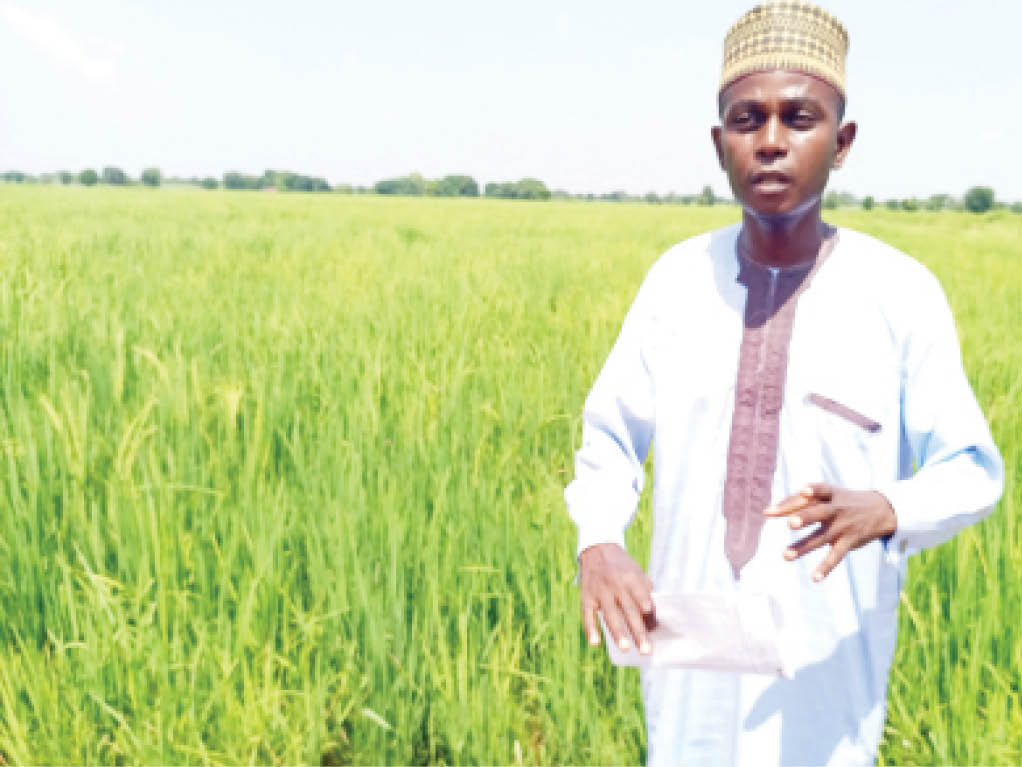…Want urgent FG, CBN interventions
For many years wheat production has been stagnant and the challenges before its farmers are many.
Although President Muhammadu Buhari launched the rice and wheat Anchor Borrower Programme (ABP) in November, 2015, rice has since given wheat a huge gap in terms of production.
Despite huge potential, production has plummeted from 600,000 metric tonnes to a pathetic 50,000 metric tonnes.
Although the Lake Chad Research Institute in Borno State has released improved seed varieties, production has remained low.
The United States Department of Agriculture (Foreign Agricultural Services) in a report noted that the country cares less about promoting wheat production. It said “Nigeria’s wheat production in marketing year 2021/2022 is to reach 55,000 metric tons (MT). Area harvested the same marketing year is also expected to decrease by 5,000 hectares, from 60,000 hectares forecast by USDA in the previous year to 55,000 hectares. Banditry and kidnapping activities have reached high levels in Northwest Nigeria, which is the primary wheat cultivation region.”
In Kano, this reporter visited a number of young wheat farmers as they were reluctantly preparing for cultivation this season.
The motivation for such reluctant preparation is hinged on many reasons-some of which, wheat farmers across the country have been battling with for decades.
Engr Ibarahim Iliyasu is the chairman of the Kano Young Wheat Farmers Association. He told Daily Trust that the urge to cultivate wheat in Kano is going down particularly among the youth.
“Before now, our problem had been seed, but that has been resolved at least. However, the market issue remains a big problem. Unlike rice where you have many processing mills in Kano, wheat does not,” he said.
This, Engr Iliyasu said affects their ability to expand production, adding that, “When you go into massive production, the fear that you will now have is, who is coming to buy it from you and at what price?”
He said an arrangement such as the CBN’s Anchor Borrowers’ Programme, where the farmers are linked up with the Anchors (off-takers), would reduce this problem but despite several attempts, they did not succeed.
The farmer said though government intends to reach farmers with lots of interventions, he believes the problem lies largely with those administering such intervention as it does not trickle down to the farmers.
Mohammed Alhaji Suleman, who is also a young wheat farmer and the financial secretary of the association, said wheat which is a dry season crop is not given the required attention compared to rice.
His major worry is that anytime government comes up with an intervention, it is being hijacked by politicians, adding that, “we will remain in the farms suffering because these things don’t get to us.
“If I have the intention to cultivate three or four hectares, it will be difficult for me to do that without any assistance because the cost of fertiliser, herbicides and insecticides is now very high,” he said.
For him, the rising cost of inputs in the last few years has been a major headache, noting that getting fertiliser as and when due is difficult. “If government is given any input, before you get there it’s no more. You have to go to the open market where you buy at N15,000 or N16,000 and sometimes even at N17,000. At that price, how many can you afford to apply in your farm in order to get something? For chemical, it is something else. You buy today and by the time you return tomorrow, it has gone up by either N1000, N1, 500 or N2000 ,” he explained.
Mr Abubakar Ibrahim has a bitter experience when it comes to wheat farming.
“For wheat, we have huge problem. Last year, we hired over ten hectares of land and after land preparation, we were waiting for the intervention which we registered and supplied all the necessary information, but that did not happen and we lost the money we borrowed to rent the land.
“When your crop needs fertiliser, you will not get it and for the little that you cultivate, marketing it becomes another issue,” he said.
For other young farmers like Mu’azu Ahmed Mohammed, Abdullahi Yukubu and Iliyasu Haruna, wheat farming needs to be reorganised because those benefiting are marketers, who are better informed, organised and highly effective in using market techniques.
“On the other hand, the farmers are very vulnerable and unprotected; it is just like we work for them. They decide what price to buy and as smallholders, there is very little we can do. In fact, those in tomato cultivation suffer more. Sometimes at the peak of glut, an empty basket is worth more than the tomato in it,” Mu’azu Mohammed lamented.
The farmers want the Central Bank of Nigeria (CBN), federal and the state governments to begin the process of intervention immediately as cultivation begins between the end of this month and November.
According to the Extension Bulletin No. 62 on Wheat Production in Nigeria” Wheat flour constitutes 85-99% recipe in bread and cake, Semovita (10%), biscuit (about 4%), pasta (below 1 %), macaroni and spaghetti (below 1 %). Wheat is commonly milled at 75-76% extraction rate. The offals (residues) are used in the feed-mills in compounding livestock feeds.

 Join Daily Trust WhatsApp Community For Quick Access To News and Happenings Around You.
Join Daily Trust WhatsApp Community For Quick Access To News and Happenings Around You.


